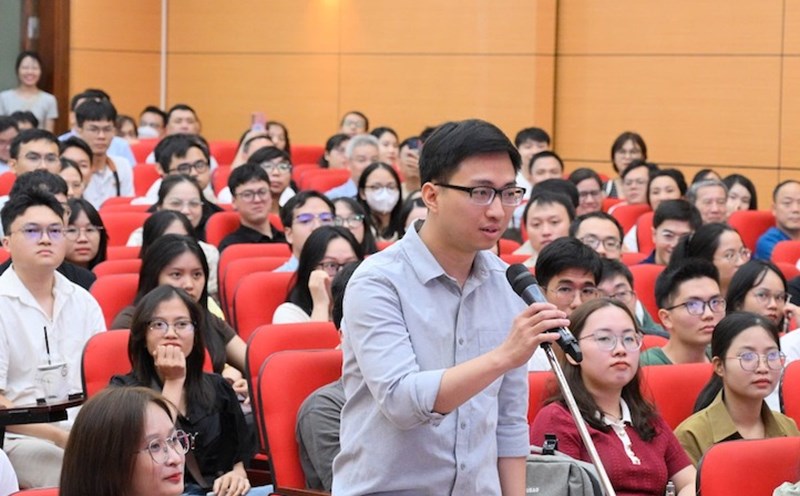Match Day September 9 at Hanoi Medical University "caused a storm" when 426 boarding doctors were selected from 1,009 records. With just a few selections, "hot" majors such as obstetrics and gynecology and plastic surgery have filled their seats, reflecting attraction and fierce competition.
According to Dr. Nguyen Quang Bay, Head of the Department of Endocrinology - Diabetes, Bach Mai Hospital, many recent articles revolving around the "phenomenon of inpatients" mainly rely on the moment of " Matching" but few people really understand the training process and assessment criteria. Many information is therefore misunderstood, leading to excessive praise.
Common mistakes to clarify
Resident doctor training is a specialty of medical human resource training in Vietnam: We only study in advanced countries such as the US, France, and the UK. In fact, this is just a transitional training program because newly graduated doctors do not have enough professional capacity, so they need additional training and specialized training. anyone with tooth pain, eye pain, swollen joints or cervical vertebrae... wants to see a specialist, not a general practitioner.
In addition to the exam requirement, many young doctors choose to work early at a suitable hospital, accumulate skills and then study for a master's and doctorate degree. The academic path is wide and does not only go through the doors of resident doctors.
Studying as a resident is not the only way to become a good doctor. High school, major I, doctoral studies, international scholarships... are all good routes. Resident doctors are suitable for people who are truly loved, capable and self-disciplined.
The inpatient doctor recruitment exam is extremely difficult - it is necessary to look back at the data. If the admission rate is often over 50%, the exam tends to focus on entrance exams rather than top-notch classification. A " harsh" exam on layering often has a passing rate of around 20% - a number that speaks to the goal of the exam.
Approving for a resident doctor is certain to be successful, this is uncertain. Good students and successful people do not mean the same thing. High scores may reflect review skills, but creativity, adaptation, communication, teamwork... are the keys to clinical practice.
To become a resident doctor is talented right away - mistaken for ability level: Usually, inpatient training programs such as ACGME (USA) or Australia will be divided into 5-7 capacity levels, where the first-year resident doctors are only equivalent to 0.5 - 1, that is, equal to or lower than the level/capacity of the 6th year medical student. Most boarding doctors consider a 5/6 level as a success when graduating. Even accept the 4/6 capacity level for poor inpatients. Of course, many of you are at 6/6.
Studying as a resident is similar to studying in other postgraduate programs: Resident medicine is learning in a residential environment. All night long, taking a heavy exam, and giving strict feedback is normal because in front of the patient's life, behind the law.
All boarding doctors upon graduation are the quintessence: This is a long race that requires continuous reading - learning - work. Everywhere there are caregivers and lazy people; don't abuse the labels "elusive" and "super good".
Just get a boarding doctor and you will graduate: Previously, many courses had people who did not meet the requirements because of their price points, on-duty discipline, professional attitude... Recently, standards have been broader, but the training ideal still needs to be strict.
Having enrolled as a resident, you must try to study at all costs: Don't choose a "hot" major just because of a high score or "difficult" because of a low score. If not suitable, they can retake the exam and change the grades to be more suitable - the medical profession is a long way, not a temporary race.
3 years of inpatient treatment and 6 years of university are too long: In reality, it is still short. Many countries train resident doctors for 4-5 years, even 8-9 years for neurologist... In return, after training, they can apply for high academic positions at hospitals.
Resident doctors are treated as main doctors: Resident doctors are postgraduate students, mostly with a capacity of 2 - 4/6 and do not have an independent practice certificate. They are only allowed to work under supervision and are not allowed to arbitrarily prescribe, prescribe, or intervene.
Studying for a resident doctor is expensive because it is not researched: Medical training is expensive everywhere. Tuition fees can be considered, choose a boarding doctor funded by a number of facilities, health departments or schools; but if you have accepted the commitment, you must respect the commitment.
All boarding doctors who have graduated are allowed to be paved into large hospitals: The number of training increases sharply, it is impossible to "automatively" enter the top hospitals. People who are truly good are still sought after by major hospitals; the private and international sectors are also attractive choices - as long as their ability has been proven for 3 years.
Resident doctors are not good enough to study only their profession: A complete doctor needs to communicate, report bad news, work in groups, self-study for life, professional ethics and social responsibility. Good workers are a necessary condition, professional quality is a sufficient condition.
The title of resident doctor is sometimes distorted by the heat of social networks. The new generation of resident doctors understand this very well, so they should "show off" less and choose to focus on seriously preparing for the upcoming journey.






